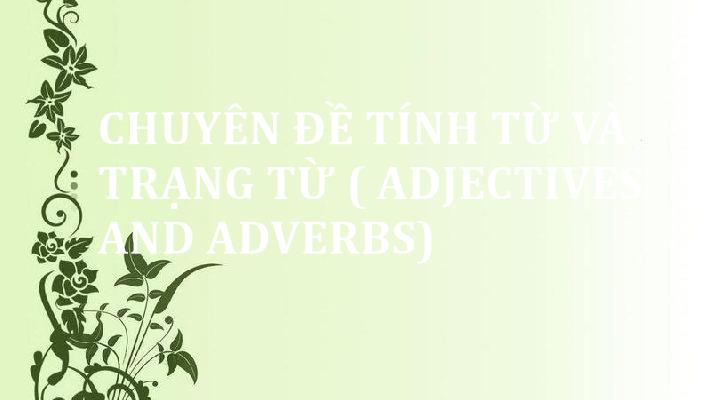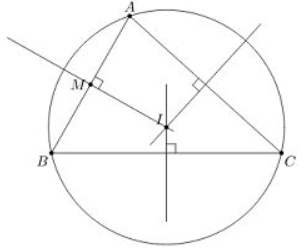THE PRESENT PERFECT ( HIỆN TẠI HOÀN THÀNH)
I – Theory (Lý thuyết)
1. Uses (cách dùng)
+) Diễn tả 1 sự việc, hành động bắt đầu từ trong quá khứ, kéo dài liên tục đến hiện tại, hoàn thành ở hiện tại và có thể tiếp tục trong tương lai, thường đi với “since” hoặc “for”
Eg: I have learned English for 5 years.
I have learned English since 2004.
* Cách dùng since, for:
Since + mốc thời gian trong quá khứ: +) 1 cụm thời gian trong quá khứ
+) 1 mệnh đề ở quá khứ đơn
Eg: since 1982, since January…
For + 1 khoảng thời gian, tính từ quá khứ đến hiện tại
Eg: for three days, for twenty years…
* chú ý: tuy nhiên, since/ for có thể xuất hiện ở thì quá khứ đơn hoặc các thì khác.
Eg: I lived in London for 5 years then I moved to New York.
+) Diễn tả sự việc, hành động đã xảy ra trong quá khứ như là 1 nguyên nhân mà hậu quả còn ở hiện tại.
Eg: She has broken her leg, so she can’t play tennis.
Eg2: I can’t do my homework because I have lost my pen.
+) Diễn tả 1 sự việc, hành động vừa mới xảy ra, thường đi với trạng từ “just”. Tuy nhiên vẫn có thể chia ở quá khứ đơn cho hành động này.
Eg: I ( have) just arrived at the airport.
+) Ngoài ra, HTHT còn đi với 1 số trạng từ sau:
• already: đã
• yet ( cho đến bây giờ, chỉ dùng trong câu phủ định và nghi vấn)
Eg: Have you done your homework yet?
I haven’t done my homework yet.
• never: chưa từng
• ever: đã từng
Eg: I’ve never visited HCM city
Have you ever visited HCM city?
• before : trước đây
Eg: I haven’t eaten this food before.
• up to now/ so far: cho đến bây giờ
• recently/ lately: gần đây.
* chú ý: cần chú ý về vị trí của các trạng từ trên:
- đứng giữa “have/ has” và P2: just, already, ever, never
- đứng cuối: before, yet.
- đứng linh hoạt: up to now, so far, recently, lately.
2. Forms (cấu trúc)
(+) S + have/ has + P2 ( past participle, động tính từ quá khứ)
(-) S + haven’t / hasn’t + P2
(?) Have/ has + S+ P2
(?) Wh_ have/ has + S + P2
Eg: (+) We have studied English for 5 years.
(-) We haven’t studied English for 5 years.
(?) Have you studied English for 5 years?
(?) How long have you studied English?
Eg 2: (+) He has had his car since he was 20.
(-) He hasn’t had his car since he was 20.
(?) Has he had his car since he was 20?
(?) What has he had since he was 20?
II- Bài tập
Bài 1: Chuyển các câu sau sang phủ định và nghi vấn:
1. I have received his letter for 2 days.
(-)
(?)
(?)
2. He has worked very hard at that job.
(-)
(?)
(?)
3. They have waited for Mr. Wilson.
(-)
(?)
(?)
4. We have been to Da Lat 3 times.
(-)
(?)
(?)
Bài 2: Viết lại các câu sau sao cho nghĩa không đổi:
1. I finished my work two hours ago.
→
2. The film started half an hour ago.
→
3. I have studied English for five years.
→
4. Daniel hasn’t been here since 1986.
→
5. I last visited Ho Chi Minh city two years ago.
→
Bài 3: Điền dạng đúng của động từ trong ngoặc ở thì hiện tại hoàn thành:
1. We (visit) that museum.
2. Yibo (just finish) the work.
3. I (live) in this city all of my life.
4. You (ever be) to Russia?
5. He (already buy) that house.
6. She (not find) her lost son yet.
7. You (ever read) any English books?
8. We (never watch) that TV programme before.
9. My brother (write) several plays. He (just finish) his second tragedy.
10. My family (live) in this city for almost six years.
Đáp án:
Bài 1:
1. I have received his letter for 2 days.
(-) I haven’t received his letter for 2 days.
(?) Have you received his letter for 2 days?
(?) How long have you received his letter?
2. He has worked very hard at that job.
(-) He hasn’t worked very hard at that job.
(?) Has he worked very hard at that job?
(?) How has he worked at that job?
3. They have waited for Mr. Wilson.
(-) They haven’t waited for Mr. Wilson.
(?) Have they waited for Mr. Wilson?
(?) Who have they waited for?
4. We have been to Da Lat 3 times.
(-) We haven’t been to Da Lat 3 times.
(?) Have you been to Da Lat 3 times?
(?) How many times have you been to Da Lat?
Bài 2:
1. I finished my work two hours ago.
→ I have finished my work for two hours.
2. The film started half an hour ago.
→ The film has started for half an hour.
3. I have studied English for five years.
→ I started studying English five years ago.
4. Daniel hasn’t been here since 1986.
→ The last time Daniel was here was in 1986.
5. I last visited Ho Chi Minh city two years ago.
→ I haven’t visited Ho Chi Minh city for two years.
Bài 3:
1. We (visit) that museum.
have visited
2. Yibo (just finish) the work.
has just finished
3. I (live) in this city all of my life.
have lived
4. You (ever be) to Russia?
Have you ever been
5. He (already buy) that house.
has already bought
6. She (not find) her lost son yet.
hasn’t found
7. You (ever read) any English books?
Have you ever read
8. We (never watch) that TV programme before.
have never watched
9. My brother (write) several plays. He (just finish) his second tragedy.
has written has just finished
10. My family (live) in this city for almost six years.
have lived







